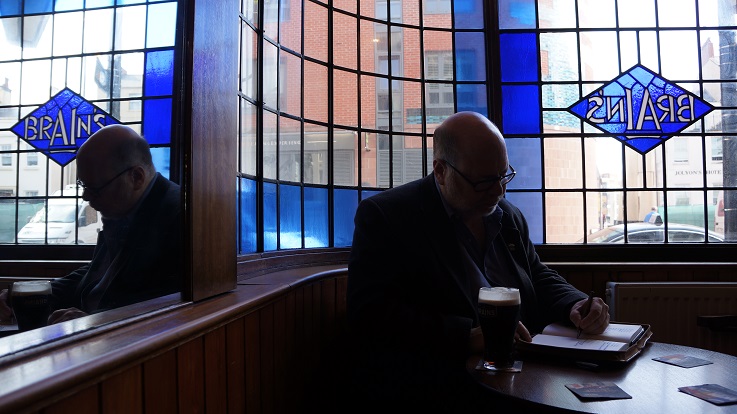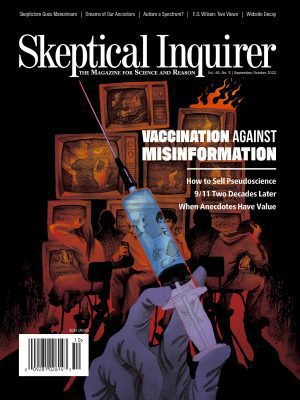 |
We were in the car travelling through the night. I was four or five or six, sitting on the backseat of the Studebaker with my older sister. She had to have been there. Five or six years older than me, where else could she have been, yet I have no memory of her presence? I think in that moment, over sixty years ago, the seed of my scepticism was planted.
My father was behind the wheel, my mother alongside. I asked my father, “Where do we go when we die?” In that moment, my father’s thoughtfulness rendered a core principle that would serve me the rest of my life; he answered, “I don’t know.”
Quickly processing the significance of his answer, I began to cry. I declared aloud how I didn’t want him to die. I then realized, I did not want to die, but whether I declared this second thought aloud or said it to myself, I can no longer remember. My mother was angry with him and decried, “Why didn’t you lie to him?” It was her response that solidified my newly acquired point of view; people don’t know what happens after death and people lie when they say they do.
My parents never knew the depth to which their one short sentence each permeated my soul. That night would have faded from their memories by the next night, yet I still remember it, if imperfectly. However, the realization I would die one day subsided after that night, as I was preoccupied with childhood.
Throughout childhood, I believed in a god because everybody did. Surely, adults would understand these things better than me. It wasn’t until I was twelve that I was introduced to atheism. We were all twelve-year-olds in those special after-school classes at the synagogue. There we were expected to learn Hebrew and Jewish history. The Hebrew certainly didn’t take. The next year, I would sputter and stutter through my bar mitzvah reading of the Torah. I read to the congregation the “Book of Esther”, even while I was already doubting the existence of a god.
It was in that class the year before, I discovered an atheist. Frequent outbursts came from fellow Hebrew school classmate J. J defied any nonsense attributed to a god. Unfortunately for J, he was ostracized by his peers for his outbursts and bizarre confidence. He was willing to shout at the teacher while gesticulating wildly with his wiry arms. Years later, he would run for class president in our high school, even though he was one of the least popular kids in school. He won some votes the same way Mickey Mouse did. Teenagers are notorious anarchists. On the one hand, he had excellent grades, but everyone knew he spent a year or two in the local school for “retarded” children. I suspected him of being a mad genius who simply would not put up with bullshit. I wonder if constant ridicule and bullying didn’t make him snap. (He once stabbed a teacher with a pen.) But it was J’s rages in Hebrew school that made me wonder, what if he’s right?
The god I believed in was all-powerful, all-knowing, and good. Such a god had nothing to fear from the truth. My god would not be offended by any challenge. Being the truth, my god knew I could only find my way back to god. So it was, at twelve years of age, I began with a thought experiment; not to believe in something merely because I wanted it to be true. It became a guiding principle for the rest of my life. I think it was this very thought experiment that unleashed my fear of death.
For my entire young adulthood, I adopted and discarded an assortment of beliefs, trying them on like suits of clothes, then destroying them through hard wearing or simply outgrown them. God vanished. It wasn’t only because there was no evidence for a god. I could find no excuse for a god’s existence beyond desire. Meanwhile, on the subject of desire, it was hard to employ the powers of reason when you are a young adult being poisoned by your hormones. There are a wealth of embarrassing stories I shall always be too shy to publish. Sorry, folks.
Scepticism does not come to me naturally. I must work at it and constantly hone my Ockham’s razor. It is mental discipline. I think I am getting better at it as I age.
In the 1980s, I was making slow progress in the philosophy of skepticism, pushing along a jungle path with a dull machete, when I discovered I was not alone. I found where someone had cleared a broader path before me. More than that, it was paved and well lit. It happened while I was working through the backlog of Scientific American magazines. I had a subscription, but was finding it difficult to keep up. Much of the content was beyond my grasp, but I still felt I was gaining knowledge from the small amount I could digest. In every issue, Martin Gardner had a column, “Mathematical Games”. They were always beyond me. He retired. In the space he once filled appeared Douglas Hofstadter. It was one of Hofstadter’s columns, “Metamagical Themas”, that introduced me to Skeptical Inquirer. Skeptical Inquirer was a journal whose aim was to “combat nonsense” through clear and rational analysis. It debunked con artists and woo-woo. (Woo-woo is a term for belief in the occult, the paranormal, and the supernatural.)

Being a sceptic requires embracing mystery. The more you discover enlarges the area of your knowledge. It also lengthens the borders. Beyond those borders is the evermore you do not know. This widening threshold can only be stretched further with the application of the scientific method. About that for which you do not have the evidence, yet, you must confess, “I do not know.”
Astrophysicist Neil deGrasse Tyson gives an excellent summary of the scientific method in one sentence, taken from his latest book, Starry Messenger. "Do whatever it takes to avoid fooling yourself into believing that something is true when it is false, or that something is false when it is true."
Sixty years later, I still do not believe in a god. A friend once asked me if I hated religion. I didn’t when he asked, but I’m not so sure anymore. Quoting Steven Weinberg, theoretical physicist, “With or without religion, good people can behave well and bad people can do evil; but for good people to do evil - that takes religion.”
![]()
Mr Bentzman will continue to report here regularly about
the events and concerns of his life. If you've any
comments or suggestions, he would be pleased to hear from you.
You can find his
several books at www.Bentzman.com.
Enshrined
Inside Me, his second collection of
essays, is now available to purchase.
